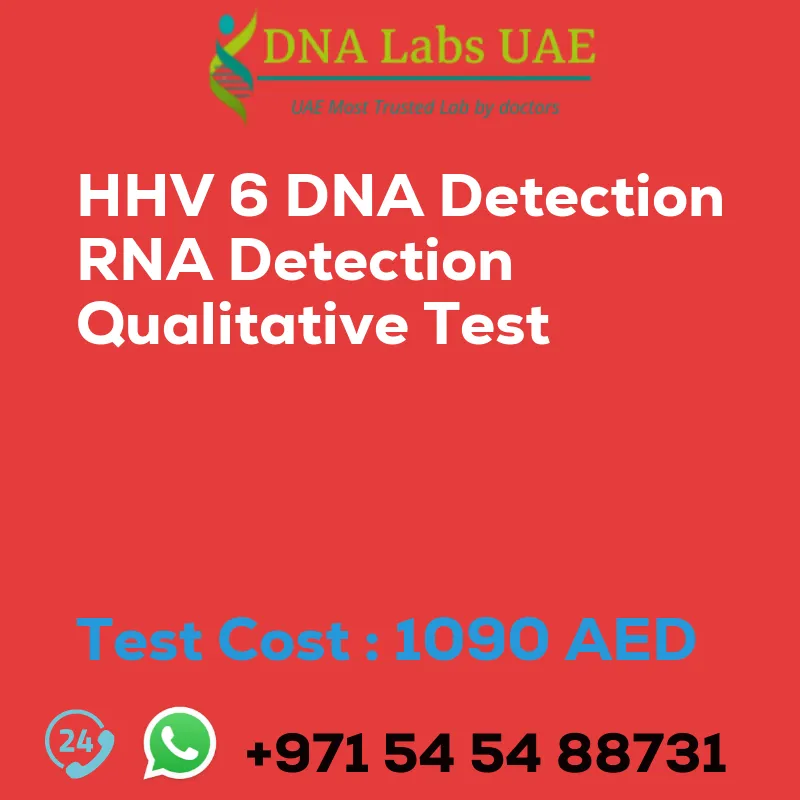HHV 6 DNA detection RNA Detection Qualitative Test
At DNA Labs UAE, we offer the HHV 6 DNA detection RNA Detection Qualitative Test at a cost of 1090.0 AED. This test is used to detect the presence of HHV-6, also known as human herpesvirus 6, in patients.
Test Details
HHV-6 is a common virus that infects humans and is categorized into two subtypes: HHV-6A and HHV-6B. The HHV-6B subtype is the most prevalent and is associated with various diseases, including roseola infantum.
Qualitative tests for HHV-6 detection can be performed using either DNA or RNA detection methods. These tests aim to determine the presence or absence of the virus in a patient’s sample.
DNA Detection
There are several methods for DNA detection of HHV-6:
- Polymerase Chain Reaction (PCR): This method amplifies specific DNA sequences of the HHV-6 genome, allowing for the detection of the virus. It is highly sensitive and can detect even low viral loads.
- Real-time PCR: This technique is similar to PCR but provides real-time monitoring of DNA amplification. It allows for quantification of viral DNA and provides information on the viral load.
- Nested PCR: This method involves two rounds of PCR amplification, increasing the sensitivity of HHV-6 detection. It is particularly useful when viral loads are low.
RNA Detection
There are also methods for RNA detection of HHV-6:
- Reverse Transcription PCR (RT-PCR): This technique is used to detect viral RNA by first converting it into complementary DNA (cDNA) using reverse transcriptase. The cDNA is then amplified using PCR. RT-PCR is commonly used to detect RNA viruses like HHV-6.
- Real-time RT-PCR: Similar to real-time PCR, this method allows for real-time monitoring and quantification of viral RNA. It is useful for determining viral load and monitoring the progression of HHV-6 infection.
Test Samples and Report Delivery
The HHV 6 DNA detection RNA Detection Qualitative Test can be performed on various clinical samples, including saliva, whole blood, cerebrospinal fluid, lymph node, and biopsy samples. The report will be delivered within the 3rd working day via email (36 hours) or phone (24 hours).
Test Department and Doctor
This test is conducted by our Genetics department and can be ordered by a Physician.
Pre Test Information
Prior to the test, patients are required to sign a consent document and provide any clinical history of the patient for HHV 6 (DNA detection) (RNA Detection) Qualitative Test.
These qualitative tests are crucial in diagnosing HHV-6 infections, especially in immunocompromised individuals or patients with suspected HHV-6-associated diseases.
| Test Name | HHV 6 DNA detection RNA Detection Qualitative Test |
|---|---|
| Components | |
| Price | 1090.0 AED |
| Sample Condition | Saliva, Whole Blood, CSF, Lymph node, Biopsy |
| Report Delivery | 3rd Working Day Email:-36 hours. On phone: 24 hours |
| Method | Real Time PCR |
| Test type | Viral |
| Doctor | Physician |
| Test Department: | Genetics |
| Pre Test Information | Need to sign Consent document and bring any clinical history of patient forHHV 6 (DNA detection) (RNA Detection) QualitativeTest |
| Test Details |
HHV-6, also known as human herpesvirus 6, is a common virus that infects humans. It is categorized into two subtypes: HHV-6A and HHV-6B. HHV-6B is the most prevalent subtype and is associated with various diseases, including roseola infantum (a common childhood illness). Qualitative tests for HHV-6 detection can be performed using either DNA or RNA detection methods. These tests aim to determine the presence or absence of the virus in a patient’s sample. DNA Detection: 1. Polymerase Chain Reaction (PCR): This method amplifies specific DNA sequences of the HHV-6 genome, allowing for the detection of the virus. It is highly sensitive and can detect even low viral loads. 2. Real-time PCR: This technique is similar to PCR but provides real-time monitoring of DNA amplification. It allows for quantification of viral DNA and provides information on the viral load. 3. Nested PCR: This method involves two rounds of PCR amplification, increasing the sensitivity of HHV-6 detection. It is particularly useful when viral loads are low. RNA Detection: 1. Reverse Transcription PCR (RT-PCR): This technique is used to detect viral RNA by first converting it into complementary DNA (cDNA) using reverse transcriptase. The cDNA is then amplified using PCR. RT-PCR is commonly used to detect RNA viruses like HHV-6. 2. Real-time RT-PCR: Similar to real-time PCR, this method allows for real-time monitoring and quantification of viral RNA. It is useful for determining viral load and monitoring the progression of HHV-6 infection. These qualitative tests can be performed on various clinical samples, including blood, cerebrospinal fluid, and tissue samples. They are crucial in diagnosing HHV-6 infections, especially in immunocompromised individuals or patients with suspected HHV-6-associated diseases. |







